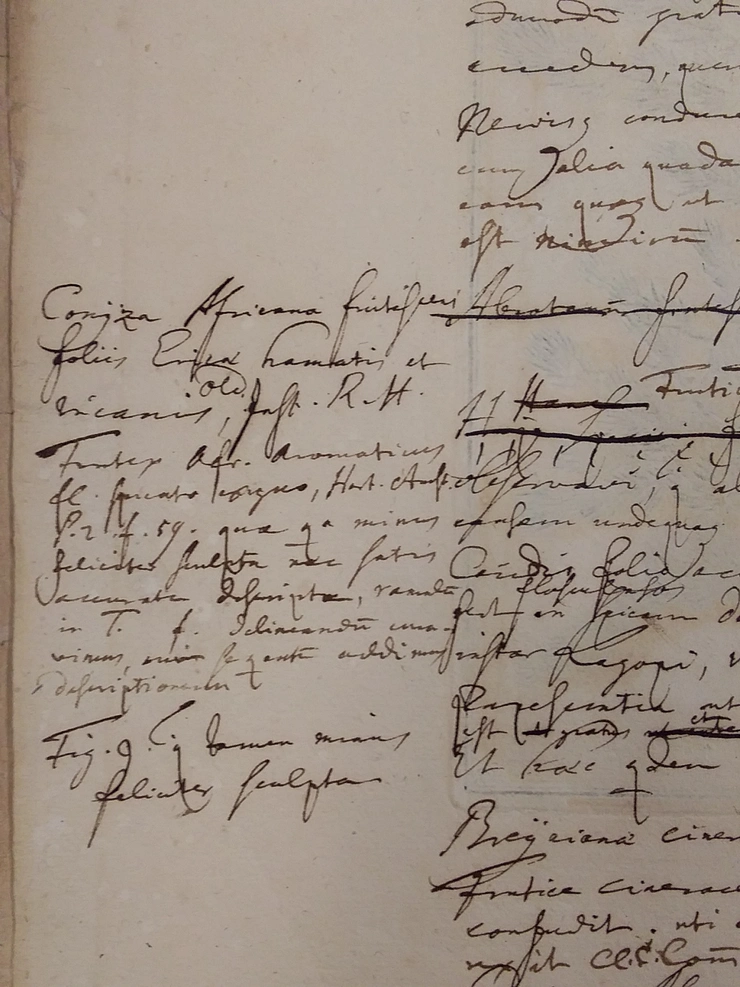I am a historian of early modern science and knowledge with a focus on seventeenth- and eighteenth-century natural history. Recently, I have been working on the collaborative knowledge culture of eighteenth-century botany, the botanical correspondence as an information system, botany and its use of books, the networked practices of botanical nomenclature, the history of scientific authorship, and translations in the history of science.

Networked texts. Practices of writing, reading, and publishing in seventeenth- and eighteenth-century botany
This project investigates the intertwined practices of making and publishing botanical knowledge that undepin the networked knowledge culture of early modern botany. The focus will be on text-related practices that have been overshadowed by a lasting fascination with scientific objects. These ways of making and publishing botanical texts generated a publishing system that was utilised by and, at the same time, constituted the botanical community.
For botanists of the 17th and 18th centuries - in this project we are talking about male scholars - the compilation of their works meant a process that involved contributions from several, sometimes countless, people and lasted for years. Authors updated their local or regional floras in cycles of additions and corrections. As soon as new information became available, it was incorporated into a work and an updated edition was published. As a result, most botanical publications were both provisional and iterative. It will be shown how this way of working enabled the botanical community to keep pace with the ever-expanding information needs of their discipline and to develop forms of writing, reading and publishing that catered for the constant need to correct the information being processed.
https://www.researchgate.net/profile/Bettina-Dietz
erfurt.academia.edu/BettinaDietz
Monographs
Das System der Natur. Die kollaborative Wissenskultur der Botanik im 18. Jahrhundert, Köln / Wien 2017 (Böhlau Verlag).
Utopien als mögliche Welten. Voyages imaginaires der französischen Frühaufklärung, 1650-1715, Mainz 2002 (= Veröffentlichungen des Instituts für Europäische Geschichte, v. 188).
Edited volumes and special issues
Special issue “Cultures of Scientific Publishing” (guest-editor), History of Science 60/2, (2022).
Special issue “Translating and Translations in the History of Science” (guest-editor), Annals of Science 73/2 (2016).
Bilder des Fremden. Mediale Inszenierung von Alterität, 1780-1920 (together with Paul Hempel and Hans-Peter Bayerdörfer), Münster 2007.
Journal articles (peer reviewed*)
Herbaria as manuscripts. Philology, ethnobotany, and the textual-visual mesh of early modern botany, in: History of Science (available online, in print 2024).*
Introduction: Towards a History of Scientific Publishing, in: Cultures of Scientific Publishing (special issue), in: History of Science 60/2 (2022), 155-165.*
Iterative Books. Posthumous Publishing in Eighteenth-Century Botany, in: History of Science 60/2 (2022), 166-182.*
Networked Names: Synonyms in Eighteenth-Century Botany, in: History and Philosophy of the Life Sciences 40 (2019), article 4.*
Linnaeus’ Restless System: Translation as Textual Engineering in Eighteenth-Century Natural History, in: Annals of Science 73/2 (2016), 143-156.*
Introduction: Translating and Translations in the History of Science, in: Annals of Science 73/2 (2016), 117-121.*
Contribution and Co-production: The Collaborative Culture of Linnaean Botany, in: Annals of Science 69/4 (2012), 551-569.*
Making Natural History: Doing the Enlightenment, in: Central European History, 43/1 (2010), 25-46.*
Aufklärung als Praxis: Naturgeschichte im 18. Jahrhundert, in: Zeitschrift für Historische Forschung 36/2 (2009), 235-257. (reviewed)
Mobile Objects: The Space of Shells in Eighteenth-Century France, in: The British Journal for the History of Science 39/3 (2006), 363-382.*
Collections Curieuses: The Aesthetics of Curiosity and Elite Lifestyle in Eighteenth-Century Paris, in: Eighteenth-Century Life 29/3 (2005), 24-75 (together with Thomas Nutz).*
Naturgeschichte des Menschen als Wissensformation des späten 18. Jahrhunderts: Orte, Objekte, Verfahren, in: Zeitschrift für Historische Forschung 32 (2005), 45-70 (together with Thomas Nutz). (reviewed)
Utopie und Policey: Frühneuzeitliche Konzeptionen eines idealen Ordnungsstaates, in: Zeitschrift für Historische Forschung 30 (2003), 591- 617. (reveiwed)
Vom Giganten zum Elefanten: Kontroversen über Fossilien, 1610-1820, in: Archiv für Kulturgeschichte 85 (2003), 277-302. (reveiwed)
Chapters in edited volumes
Knots in a Web. Botany, Materia Medica, and South Asian Languages in the Publication of Paul Hermann’s Ceylon-Herbaria (ca. 1690-1770), in:
Fabrizio Baldassarri (ed.): Plants in the 16th and 17th centuries, Berlin 2023 (Walter de Gruyter), 197-210.
What is a Botanical Author? Pehr Osbeck’s Travelogue and the Culture of Collaborative Publishing in Linnaean Botany, in: Stéphane van Damme / Hanna Hodacs / Kenneth Nyberg (eds.): Linnaeus, Natural History, and the Circulation of Knowledge (= Oxford University Studies in the Enlightenment), Oxford 2018 (Voltaire Foundation), 57-79.
Kollaboration in der Botanik des 18. Jahrhunderts. Die partizipative Architektur von Linnés System der Natur, in: Anne Mariss / Silke Förschler (eds.), Verfahrensweisen der Naturgeschichte, Köln / Wien (Böhlau) 2017, 95-108.
Natural History as Compilation: Travel Accounts in the Epistemic Process of an Empirical Discipline, in: A. Holenstein / H. Steinke / M. Stuber (eds.), The Practice of Knowledge and the Figure of the Savant in the Eighteenth Century, 2 vols., Leiden / Boston (Brill) 2013, vol. 1., 703-719.
Die Naturgeschichte und ihre prekären Objekte, in: Ulrich Schneider (ed.), Kulturen des Wissens, Berlin 2008 (Walter de Gruyter), 615-621.
Phrenologie des Fremden. Das Bild(nis) der Ozeanier, 1780-1840, in: Hans-Peter Bayerdörfer / Bettina Dietz / Frank Heidemann (eds.), Bilder des Fremden. Mediale Inszenierung von Alterität im 19. Jahrhundert, Münster (LIT Verlag) 2007, 157-176.
Exotische Naturalien als Statussymbol. Die Inszenierung von Prestige und Wissen in Pariser Sammlungen des 18. Jahrhunderts, in: Hans-Peter Bayerdörfer / Eckhart Hellmuth (eds.): Exotica. Konsum und Inszenierung des Fremden, Münster 2003, 25-43.